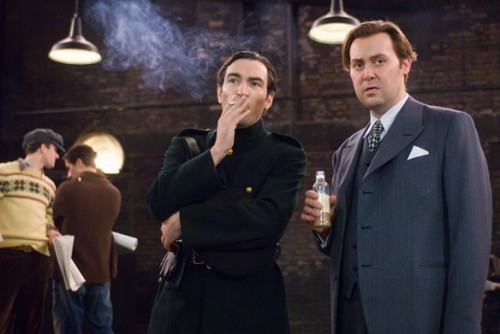Me and Orson Welles
Resurrecting the Champ

Starring: Christian McKay, Zac Efron
By Robert Patrick
Sometimes an actor’s performance is bigger than their movie. Here, it’s apparent.
When I first saw Christian McKay in Richard Linklater’s newest film, I was, subsequently, paralyzed by his uncanny resemblance to the late Orson Welles. But beyond the emotive eyebrows and the ferociousness of his vocal timbre, McKay channeled the superlative charisma and the perenially unabated egotism of Welles to a perfect degree. How was it, I thought, that McKay could play this cigar chomping, portly intellect with such a heightened sense of confidence and calm. Then I realized that it didn’t matter: McKay was Welles. Welles was McKay. I stopped trying to transfer logic to mystery and enjoyed a delightful piece of celluloid.
The production, which tells the story of a young Orson Welles, in 1937, putting on a Mercury Theater stage play of Julius Caesar, is an impressive retelling of an exciting time in the life of a youthful genius. The subject material is rife with greatness, but sometimes palpitates instead of carrying a steady beat, due mostly to an uneven screenplay – but this doesn’t keep the movie from its steady pace. Instead of continuously focusing on the monolithic and temperamental behemoth of a man in Welles, the movie shines its light on a minor player in the Julius Caesar production. The young character in question, Richard Samuels, is played by the likes of Zac Efron, the typically wide-eyed teen from Disney’s “High School Musical” fame. When confronted with the casting of Efron, you may think he spends most of his screen time lolling about, armed with nothing but his toothy grin and the occasional one liner – but the unexpected transpires, and we are given a fine performance from the young actor.
Samuels – the character that Efron is playing – is in consummate awe of his surroundings, especially when he is in the presence of theater impresario Orson Welles. And though there is respect for the megalomaniac director, Samuels begins to loathe some of Orson’s nastier personality traits. Instead of acting like an emotionless zealot in the face of Welles’ bombastic demands, Samuels ends up locking horns with the mannerless stage director. This, as one can imagine, gets messy.
With his spotty relationship with Welles looking volitile as ever – he cant decide whether he has moxy for the abrasive icon or hatred – Samuels begins to befriend all of his theater mates, whom behave more like caricatures of real people than actual individuals. All of the characters spin in circles, flail their arms around, and rock their heads back and forth like cheap baseball bobble heads. Gene Wilder’s portrayal as Willy Wonka was more grounded than some of these people – but that’s the theater life, right? The animated kaleidescope of actors in the Mercury Theater are portrayed by worthy players in Linklater’s period piece. The 1930s are captured by the smoky swagger of the music, the two toned clothes, and the era appropriate slang.
The wacky conundrums that ensue between the flamboyant cast of “Julius Caesar” are filmed with a sprite kind of glee. Some members launch into primadonna tirades, while others break down out of nervousness. All of this is centered by a love story that is anchored by the bubbly Sonja, played by Claire Danes, who is one of Welles’ most trusted assistants. The aforementioned exploits are fun, full of whimsical nuances, and wonky one liners – but that’s not that makes the film so memorable. When people look back on “Me and Orson Welles” they’ll remember the superior perfomance of Christian McKay.
McKay’s hair is whipped to the right, only slightly draped over his tyrannical eyebrows. And with his bulbous eyes and similar body structure, there is no question that Welles has been chaneled. Aside from the body and facial resemblances, McKay’s voice penetrates the film with the arrogant hum of Welles’ trademark drawl. There are times, when McKay is marching back and fourth on the stage, lifting his eyebrows and smirking all the while, that it feels like you are watching something truly transcendental onscreen.
My main complaint is that McKay isn’t on display nearly enough. Wouldn’t it be nice, in theory, to have a complete movie about Orson Welles? I don’t see a particular shortage in interesting subject matter when sifting through the man’s life. Imagine Martin Scorsese’s movie, “The Aviator”, if it had been about one of the Spruce Goose’s engineers instead of Howard Hughes himself – why waste DiCaprio’s performance? Here, with McKay’s outing, Linklater wasted a perfect opportunity to explore the hubris of Welles’ immaculately egocentric mind.
No matter, it’s still a good film.
Welles himself, a graceful bulldog with a ferocious bite, was a charismatic bully; he spoke with confidence and wit, but swung his fist like a scythe when upset. Welles always had a witty retort within arms reach, as if he pinned them underneath his suspenders. McKay captures the boastful tics, the magical lore, the effortless intrigue with his performance.
More importantly, Efron and Danes refuse to stumble over each other in what could’ve been a silly masquerade of era appropriate clothing, and instead give adequate performances that buoyantly assist the screenplay. Linklatter’s direction is obvious, as he works with his actors strengths, giving them the opportunity to elevate the source material.
In the ending, Christian McKay is the underlining reason to see Linklater’s picture. His impenetrable performance might introduce some younger people to the glorious madman that was Orson Welles, and that, in its own right, is enough to speak highly of the film.
3.5/5
